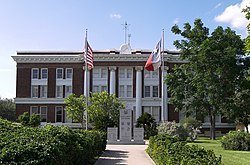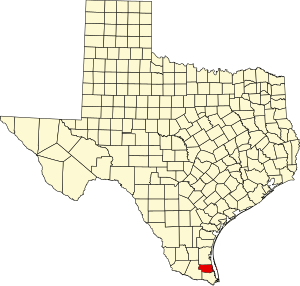Willacy County, Texas
Willacy County | |
|---|---|
County | |
 The Willacy County Courthouse in Raymondville | |
 Location within the U.S. state of Texas | |
 Texas's location within the U.S. | |
| Coordinates: 26°29′N 97°36′W / 26.49°N 97.6°W | |
| Country | |
| State | |
| Founded | 1912 |
| Named for | John G. Willacy |
| Seat | Raymondville |
| Largest city | Raymondville |
| Area | |
| • Total | 784 sq mi (2,030 km2) |
| • Land | 591 sq mi (1,530 km2) |
| • Water | 194 sq mi (500 km2) 25% |
| Population (2020) | |
| • Total | 20,164 |
| • Density | 26/sq mi (9.9/km2) |
| Time zone | UTC−6 (Central) |
| • Summer (DST) | UTC−5 (CDT) |
| Congressional district | 34th |
| Website | www |
Willacy County is a county in the U.S. state of Texas. As of the 2020 census, its population was 20,164.[1] Its county seat is Raymondville.[2] The county was created in 1911 and organized the next year.[3]
Willacy County comprises the Raymondville micropolitan statistical area, which is included in the Brownsville-Harlingen-Raymondville combined statistical area, which itself is part of the larger Rio Grande Valley region.
History
Willacy County was formed in 1911 from parts of Cameron and Hidalgo Counties, and originally included what is now Kenedy County; it was named for state senator John G. Willacy. Kenedy was split from Willacy in 1921, when the long-settled ranchers of the northern (Kenedy) part of the county sought to separate from the newly arrived farmers of the southern part.
The Bermuda onion was introduced to Willacy County in 1912. It grew well and slowly displaced ranchland in the southern part of the county, becoming the most important crop. For many years, the town of Raymondville held an annual Onion Festival, using the tag line, "The Breath of a Nation". In 1940, the first oil wells were sunk in the county's Willamar Oil Field; today, oil production is a major part of the local economy, although increasingly eclipsed by natural gas. Also in the 1940s, sorghum was introduced to the county, gradually displacing cotton and other crops. Cattle ranching remains a substantial economic activity, as well.
In the early 2010s, wind turbines began to be built in the rural part of the county east of U.S. Highway 77, a number expanded later in 2020. The turbines became an icon to the county's identity, with their being visible from northern Cameron County and eastern Hidalgo County . Power-line infrastructure was also improved in this period.
Geography
According to the U.S. Census Bureau, the county has a total area of 784 sq mi (2,030 km2), of which 194 square miles (500 km2) (25%) are covered by water.[4] The county borders the Gulf of Mexico.
Major highways
Adjacent counties
- Kenedy County (north)
- Cameron County (south)
- Hidalgo County (west)
National protected areas
Demographics
| Census | Pop. | Note | %± |
|---|---|---|---|
| 1930 | 10,499 | — | |
| 1940 | 13,230 | 26.0% | |
| 1950 | 20,920 | 58.1% | |
| 1960 | 20,084 | −4.0% | |
| 1970 | 15,570 | −22.5% | |
| 1980 | 17,495 | 12.4% | |
| 1990 | 17,705 | 1.2% | |
| 2000 | 20,082 | 13.4% | |
| 2010 | 22,134 | 10.2% | |
| 2020 | 20,164 | −8.9% | |
| U.S. Decennial Census[5] 1850–2010[6] 2010[7] 2020[8] | |||
| Race / Ethnicity | Pop 2010[7] | Pop 2020[8] | % 2010 | % 2020 |
|---|---|---|---|---|
| White alone (NH) | 2,235 | 1,805 | 10.10% | 8.95% |
| Black or African American alone (NH) | 389 | 445 | 1.76% | 2.21% |
| Native American or Alaska Native alone (NH) | 22 | 47 | 0.10% | 0.23% |
| Asian alone (NH) | 134 | 160 | 0.61% | 0.79% |
| Pacific Islander alone (NH) | 1 | 2 | 0.00% | 0.01% |
| Some Other Race alone (NH) | 9 | 34 | 0.04% | 0.17% |
| Mixed Race/Multi-Racial (NH) | 47 | 60 | 0.21% | 0.30% |
| Hispanic or Latino (any race) | 19,297 | 17,611 | 87.18% | 87.34% |
| Total | 22,134 | 20,164 | 100.00% | 100.00% |
Note: the US Census treats Hispanic/Latino as an ethnic category. This table excludes Latinos from the racial categories and assigns them to a separate category. Hispanics/Latinos can be of any race.
As of the 2010 United States Census, 22,134 people, 5,764 households, and 4,607 families were living in the county. Of all households, 46.0% had children under 18 living with them, 54.5% were married couples living together, 19.3% had a female householder with no husband present, 6.1% had a male householder no wife, and 20.1% were not families. About 32.9% of all households contained an individual who was 65 years of age or older. The average household size was 3.28, and the average family size was 3.73.
Of the population, 85.8% of residents were White (10.1% non-Hispanic white), 2.1% Black or African American, 0.6% Asian, 0.3% Native American, 9.3% of some other race and 1.8% of two or more races. 87.2% of residents were Hispanic or Latino (of any race).
In the county, the age distribution was 26.8% under 18, 12.3% from 18 to 24, 27.8% from 25 to 44, 21.4% from 45 to 64, and 11.7% who were 65 or older. The median age was 32 years.
The median income for a household in the county was $22,881, and for a family was $25,399. The per capita income for the county was $10,800. 39.4% of families and 43.4% of the population were below the poverty line, including 50.5% of those under age 18 and 38.3% of those age 65 or over. The county's per-capita income makes it among the poorest counties in the United States.[9]
Education
School districts that serve Willacy County include:[10]
- Lasara Independent School District
- Lyford Consolidated Independent School District
- Raymondville Independent School District
- San Perlita Independent School District
In addition, residents are allowed to apply for magnet schools operated by the South Texas Independent School District.[11]
All of the county is in the service area of Texas Southmost College.[12]
Media
- Raymondville Chronicle & Willacy County News – Official Site
- KFRQ 94.5FM – Official Site
- KKPS 99.5FM – Official Site Archived May 20, 2013, at the Wayback Machine
- KNVO 101.1FM – Official Site
- KVLY 107.9FM – Official Site
Prisons
Raymondville is the location of three private prisons, all adjacent to each other:[13]
- the Willacy County Correctional Center (closed 2015)
- the Willacy County Regional Detention Center
- and Willacy County State Jail
Politics
Like most majority-Hispanic counties in the Rio Grande Valley, Willacy is a staunchly Democratic county. The last Republican to win the county was Richard Nixon in 1972.
| Year | Republican | Democratic | Third party(ies) | |||
|---|---|---|---|---|---|---|
| No. | % | No. | % | No. | % | |
| 2020 | 2,441 | 43.99% | 3,108 | 56.01% | 0 | 0.00% |
| 2016 | 1,547 | 30.36% | 3,422 | 67.16% | 126 | 2.47% |
| 2012 | 1,416 | 27.96% | 3,600 | 71.09% | 48 | 0.95% |
| 2008 | 1,456 | 29.70% | 3,409 | 69.53% | 38 | 0.78% |
| 2004 | 2,209 | 44.52% | 2,734 | 55.10% | 19 | 0.38% |
| 2000 | 1,789 | 35.34% | 3,218 | 63.57% | 55 | 1.09% |
| 1996 | 1,332 | 24.62% | 3,789 | 70.02% | 290 | 5.36% |
| 1992 | 1,490 | 27.04% | 3,359 | 60.96% | 661 | 12.00% |
| 1988 | 1,750 | 35.43% | 3,165 | 64.07% | 25 | 0.51% |
| 1984 | 2,340 | 43.41% | 3,037 | 56.33% | 14 | 0.26% |
| 1980 | 1,995 | 39.06% | 3,047 | 59.65% | 66 | 1.29% |
| 1976 | 1,542 | 33.84% | 2,984 | 65.48% | 31 | 0.68% |
| 1972 | 2,317 | 62.12% | 1,384 | 37.10% | 29 | 0.78% |
| 1968 | 1,243 | 34.17% | 1,930 | 53.05% | 465 | 12.78% |
| 1964 | 1,230 | 36.30% | 2,152 | 63.52% | 6 | 0.18% |
| 1960 | 1,367 | 39.20% | 2,109 | 60.48% | 11 | 0.32% |
| 1956 | 1,656 | 56.17% | 1,261 | 42.77% | 31 | 1.05% |
| 1952 | 2,244 | 62.79% | 1,324 | 37.05% | 6 | 0.17% |
| 1948 | 676 | 35.14% | 1,139 | 59.20% | 109 | 5.67% |
| 1944 | 754 | 43.41% | 846 | 48.70% | 137 | 7.89% |
| 1940 | 740 | 38.54% | 1,173 | 61.09% | 7 | 0.36% |
| 1936 | 376 | 26.88% | 1,002 | 71.62% | 21 | 1.50% |
| 1932 | 259 | 19.89% | 1,042 | 80.03% | 1 | 0.08% |
| 1928 | 389 | 49.55% | 396 | 50.45% | 0 | 0.00% |
| 1924 | 110 | 25.35% | 307 | 70.74% | 17 | 3.92% |
| 1920 | 9 | 14.52% | 53 | 85.48% | 0 | 0.00% |
| 1916 | 10 | 8.33% | 110 | 91.67% | 0 | 0.00% |
| 1912 | 5 | 4.67% | 102 | 95.33% | 0 | 0.00% |
Communities
Cities
- Lyford
- Raymondville (county seat)
- San Perlita
Census-designated places
Unincorporated community
See also
- National Register of Historic Places listings in Willacy County, Texas
- Recorded Texas Historic Landmarks in Willacy County
References
- ^ "Willacy County, Texas". United States Census Bureau. Retrieved February 23, 2021.
- ^ "Find a County". National Association of Counties. Retrieved June 7, 2011.
- ^ "Texas: Individual County Chronologies". Texas Atlas of Historical County Boundaries. The Newberry Library. 2008. Archived from the original on May 13, 2015. Retrieved May 27, 2015.
- ^ "2010 Census Gazetteer Files". United States Census Bureau. August 22, 2012. Retrieved May 12, 2015.
- ^ "Decennial Census of Population and Housing by Decade". US Census Bureau.
- ^ "Texas Almanac: Population History of Counties from 1850–2010" (PDF). Texas Almanac. Archived (PDF) from the original on October 9, 2022. Retrieved May 12, 2015.
- ^ a b "P2 HISPANIC OR LATINO, AND NOT HISPANIC OR LATINO BY RACE – 2010: DEC Redistricting Data (PL 94-171) – Willacy County, Texas". United States Census Bureau.
- ^ a b "P2 HISPANIC OR LATINO, AND NOT HISPANIC OR LATINO BY RACE – 2020: DEC Redistricting Data (PL 94-171) – Willacy County, Texas". United States Census Bureau.
- ^ United States counties by per capita income
- ^ "2020 CENSUS - SCHOOL DISTRICT REFERENCE MAP: Willacy County, TX" (PDF). U.S. Census Bureau. Archived (PDF) from the original on October 9, 2022. Retrieved June 29, 2022. - list
- ^ "About". South Texas Independent School District. Retrieved June 29, 2022.
The district stretches over three counties, Cameron, Hidalgo and Willacy,[...]
- ^ Texas Education Code, Sec. 130.204. TEXAS SOUTHMOST COLLEGE DISTRICT SERVICE AREA..
- ^ Tyx, Daniel Blue (March 26, 2015). "Goodbye to Tent City". Texas Observer. Retrieved July 30, 2016.
- ^ Leip, David. "Dave Leip's Atlas of U.S. Presidential Elections". uselectionatlas.org. Retrieved August 2, 2018.
External links
- Willacy County from the Handbook of Texas Online.
- Historic Willacy County materials, hosted by the Portal to Texas History.
- Willacy County Profile from the Texas Association of Counties Archived September 18, 2015, at the Wayback Machine

